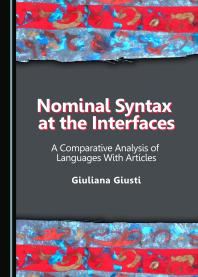(Ebook) Nominal Syntax at the Interfaces : A Comparative Analysis of Languages With Articles by Giuliana Giusti ISBN 9781443885676, 1443885673
This volume offers a new perspective on the syntax of nominal expressions in various European languages, arguing that articles do not directly and biunivocally realise semantic definiteness. The first two chapters provide an accessible introduction to recent developments in generative syntax, namely the cartographic and minimalist approaches, by focusing on the “imperfect” parallels between clauses and nominal expressions. The third chapter shows that feature sharing is not the result of a unique syntactic process, but, rather, the consequence of Merge, which creates syntactic structure instantiating two types of relation: Selection and Modification. It argues for three different ways of transferring features: Agreement allows for an argument (an independent phase, selected by a head) to re-enter the computation as part of the predicate of the new phase. It targets Person features and is not involved in the feature sharing triggered by modification. Concord copies the features of N (notably gender, number and case, where this is present). It is the result of Modification and can coexist with Agreement. Finally, Projection is triggered by multiple internal mergers of the head, bundled with all its interpretable and uninterpretable features, which may be realized in different segments. The fourth chapter focuses on the nature of determiners such as articles, demonstratives, quantifiers, possessive adjectives and pronouns, personal pronouns and proper names, and shows that only articles have the properties to be attributed to “functional heads” because they are a segment of a scattered nominal head. The rest of the volume is devoted to the analysis of syntactic phenomena, such as double definiteness, expletive articles, and weak and strong adjectival inflection, by means of the proposal that (scattered) nominal or adjectival heads concord with their modifiers. This approach reinterprets head movement in a fashion that makes it compatible with minimalist requirements, provides an explanation for the apparent optionality of head movement, eliminates the typology of head movements by adjunction or substitution, and gives an original answer to the doubts raised about the legitimacy of the very notion of “functional category”.
*Free conversion of into popular formats such as PDF, DOCX, DOC, AZW, EPUB, and MOBI after payment.


